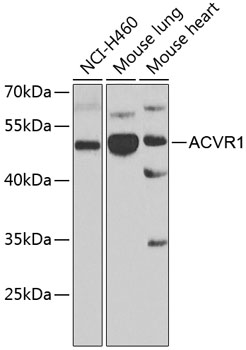Anti-ACVR1 Antibody (CAB7542)
- SKU:
- CAB7542
- Product type:
- Antibody
- Reactivity:
- Human
- Reactivity:
- Mouse
- Host Species:
- Rabbit
- Isotype:
- IgG
- Antibody Type:
- Polyclonal Antibody
- Research Area:
- Cell Biology
Description
| 抗体名: | Anti-ACVR1 Antibody |
| 抗体コード: | CAB7542 |
| 抗体サイズ: | 20uL, 50uL, 100uL |
| 申し込み: | WB |
| 反応性: | Human, Mouse |
| 宿主種: | Rabbit |
| 免疫原: | Recombinant fusion protein containing a sequence corresponding to amino acids 20-125 of human ACVR1 (NP_001096.1). |
| 申し込み: | WB |
| 推奨希釈: | WB 1:500 - 1:2000 |
| 反応性: | Human, Mouse |
| ポジティブサンプル: | NCI-H460, Mouse lung, Mouse heart |
| 免疫原: | Recombinant fusion protein containing a sequence corresponding to amino acids 20-125 of human ACVR1 (NP_001096.1). |
| 精製方法: | Affinity purification |
| ストレージバッファ: | Store at -20'C. Avoid freeze / thaw cycles. Buffer: PBS with 0.02% sodium azide, 50% glycerol, pH7.3. |
| アイソタイプ: | IgG |
| 順序: | SMED EKPK VNPK LYMC VCEG LSCG NEDH CEGQ QCFS SLSI NDGF HVYQ KGCF QVYE QGKM TCKT PPSP GQAV ECCQ GDWC NRNI TAQL PTKG KSFP GTQN FHLE VG |
| 遺伝子ID: | 90 |
| Uniprot: | Q04771 |
| セルラーロケーション: | Membrane, Single-pass type I membrane protein |
| 計算された分子量: | 57kDa |
| 観察された分子量: | 50kDa |
| 同義語: | ACVR1, ACTRI, ACVR1A, ACVRLK2, ALK2, FOP, SKR1, TSRI |
| バックグラウンド: | Activins are dimeric growth and differentiation factors which belong to the transforming growth factor-beta (TGF-beta) superfamily of structurally related signaling proteins. Activins signal through a heteromeric complex of receptor serine kinases which include at least two type I ( I and IB) and two type II (II and IIB) receptors. These receptors are all transmembrane proteins, composed of a ligand-binding extracellular domain with cysteine-rich region, a transmembrane domain, and a cytoplasmic domain with predicted serine/threonine specificity. Type I receptors are essential for signaling; and type II receptors are required for binding ligands and for expression of type I receptors. Type I and II receptors form a stable complex after ligand binding, resulting in phosphorylation of type I receptors by type II receptors. This gene encodes activin A type I receptor which signals a particular transcriptional response in concert with activin type II receptors. Mutations in this gene are associated with fibrodysplasia ossificans progressive. |
| UniProt Protein Function: | ALK2: On ligand binding, forms a receptor complex consisting of two type II and two type I transmembrane serine/threonine kinases. Type II receptors phosphorylate and activate type I receptors which autophosphorylate, then bind and activate SMAD transcriptional regulators. Receptor for activin. May be involved for left-right pattern formation during embryogenesis. Interacts with FKBP1A. Interacts with FCHO1. Expressed in normal parenchymal cells, endothelial cells, fibroblasts and tumor-derived epithelial cells. Belongs to the protein kinase superfamily. TKL Ser/Thr protein kinase family. TGFB receptor subfamily. |
| UniProt Protein Details: | Protein type:Membrane protein, integral; Kinase, protein; Protein kinase, TKL; EC 2.7.11.30; Protein kinase, Ser/Thr (receptor); TKL group; STKR family; Type1 subfamily Chromosomal Location of Human Ortholog: 2q23-q24 Cellular Component: activin receptor complex; integral to plasma membrane Molecular Function:activin binding; activin receptor activity, type I; ATP binding; protein binding; protein homodimerization activity; protein kinase activity; protein serine/threonine kinase activity; SMAD binding; transforming growth factor beta binding Biological Process: activin receptor signaling pathway; BMP signaling pathway; G1/S transition of mitotic cell cycle; negative regulation of activin receptor signaling pathway; negative regulation of signal transduction; peptidyl-threonine phosphorylation; positive regulation of bone mineralization; positive regulation of cell migration; positive regulation of osteoblast differentiation; positive regulation of transcription from RNA polymerase II promoter; positive regulation of transcription, DNA-dependent; protein amino acid phosphorylation; regulation of ossification; transforming growth factor beta receptor signaling pathway Disease: Fibrodysplasia Ossificans Progressiva |
| NCBI Summary: | Activins are dimeric growth and differentiation factors which belong to the transforming growth factor-beta (TGF-beta) superfamily of structurally related signaling proteins. Activins signal through a heteromeric complex of receptor serine kinases which include at least two type I ( I and IB) and two type II (II and IIB) receptors. These receptors are all transmembrane proteins, composed of a ligand-binding extracellular domain with cysteine-rich region, a transmembrane domain, and a cytoplasmic domain with predicted serine/threonine specificity. Type I receptors are essential for signaling; and type II receptors are required for binding ligands and for expression of type I receptors. Type I and II receptors form a stable complex after ligand binding, resulting in phosphorylation of type I receptors by type II receptors. This gene encodes activin A type I receptor which signals a particular transcriptional response in concert with activin type II receptors. Mutations in this gene are associated with fibrodysplasia ossificans progressive. [provided by RefSeq, Jul 2008] |
| UniProt Code: | Q04771 |
| NCBI GenInfo Identifier: | 462447 |
| NCBI Gene ID: | 90 |
| NCBI Accession: | Q04771.1 |
| UniProt Related Accession: | Q04771 |
| Molecular Weight: | 57,153 Da |
| NCBI Full Name: | Activin receptor type-1 |
| NCBI Synonym Full Names: | activin A receptor type 1 |
| NCBI Official Symbol: | ACVR1 |
| NCBI Official Synonym Symbols: | FOP; ALK2; SKR1; TSRI; ACTRI; ACVR1A; ACVRLK2 |
| NCBI Protein Information: | activin receptor type-1 |
| UniProt Protein Name: | Activin receptor type-1 |
| UniProt Synonym Protein Names: | Activin receptor type I; ACTR-I; Activin receptor-like kinase 2; ALK-2; Serine/threonine-protein kinase receptor R1; SKR1; TGF-B superfamily receptor type I; TSR-I |
| Protein Family: | Activin receptor |
| UniProt Gene Name: | ACVR1 |
| UniProt Entry Name: | ACVR1_HUMAN |


